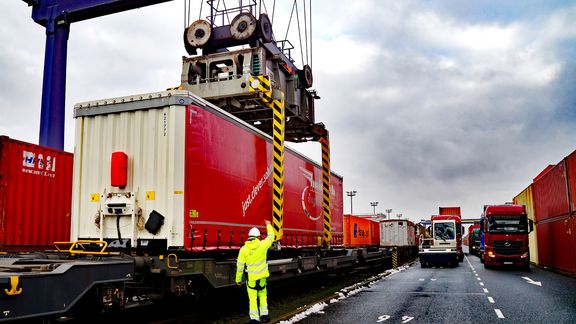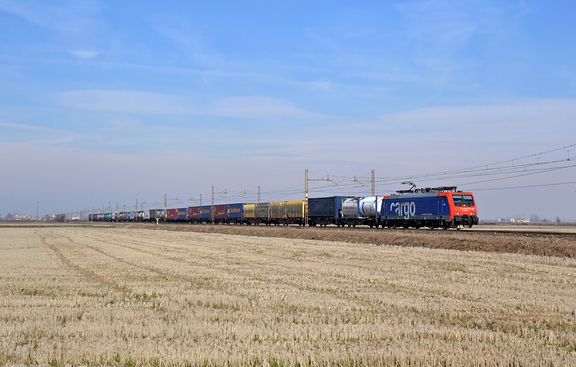Nuremberg-Rotterdam Cobelfret shuttle gets off to a good start
Mid-January of this year, Frankfurt-based Kombiverkehr expanded its portfolio of intermodal transport products to and from Rotterdam. A new continental service between Nuremberg's TriCon Terminal and Rotterdam Cobelfret has been added to the timetable for the transport of semitrailers, containers and swap bodies.

The Kombiverkehr train between Nuremberg and Rotterdam Cobelfret is a service operated in partnership with TFG Transfracht and runs five days a week, Mondays to Fridays in both directions. Shipping line CLdN Cobelfret SA runs ferry services from the ferry terminal in Rotterdam to destination ports in London, Dublin and Killingholme.
We asked Sales Manager Peter Dannewitz about the first experiences with the Nuremberg-Rotterdam Cobelfret shuttle
“The train got off to a promising start for Kombiverkehr and our main customer on this route. We have received positive feedback. Our forwarding customer has already announced further transport volumes to be additionally carried on this connection. With the start of the service, we have received further inquiries for this interesting transport corridor, especially since the onward routing to Great Britain by ferry ensures a continuous offer without time-consuming and costly customs clearance.”
This product has been developed as a response to the shortage of resources in payloads and truck drivers. How do you see this development evolving for the coming years?
“Indeed, the shortage of equipment and truck drivers, along with the major benefit of CO2 and energy savings, are important motivators for intermodal transportation. Under the current economic conditions these conditions will intensify. Combining the transport modes of ship, rail and truck can be the solution of today's challenges in efficient supply chains if the quality of service meets customer requirements.”
Is there something to be said of the kind of goods you are transporting on the Nuremberg-Rotterdam shuttle?
“Certainly, there are also differences in the weighting of the transported goods and cargos on different routes. In principle, however, it can be stated that combined transport is suitable for almost all types of goods. Today, there is hardly a good that cannot be transported by rail. Large precast concrete parts, deep-frozen goods or even glass panes up to six meters long are moved intermodally.”

What are your expectations of the volumes of cargo being shipped by Kombiverkehr via Rotterdam for 2022 and 2023?
“The Rotterdam location with its numerous port terminals is particularly important for us as a starting point for hinterland transports or the forwarding of our customers' shipments to the UK. We handle the maritime business through our associated company Optimodal B.V., which also has its headquarters in Rotterdam directly on site. This underlines our company's particular commitment to the Port of Rotterdam, which we regard as highly attractive for further growth. With our new train services to and from Nuremberg and Mortara in northern Italy near Milan, we have positioned ourselves well in the market and we are striving to grow in our continental and maritime Rotterdam services by more than 30 percent overall in the next two years.”
Can you please shed your vision on the connection between Hannover and Rotterdam? What kind of possibilities does this offer to your clients? And do you have any updates to report on the frequency and/or capacity in the coming future?
“The example of the Rotterdam Europoort to Hanover MegaHub connection illustrates Kombiverkehr's special and unique service offering. We not only connect Hanover directly, but also Lovosice, Munich, Ludwigshafen and Verona in Italy at the same time in our gateway network. Our customers thus benefit from maximum flexibility. The transfer of loading units at special hub terminals to other national or international trains usually takes place in a one-stop shop with only one booking. In hinterland traffic with Rotterdam, we see dynamic development overall. Depending on demand, we are in a position to adjust train frequencies to increased market demand, even on short notice.”